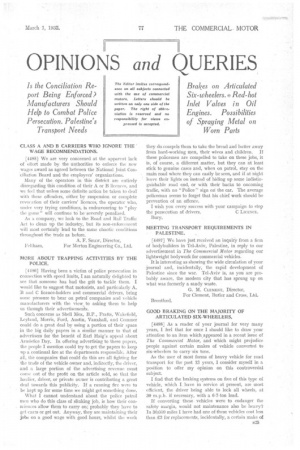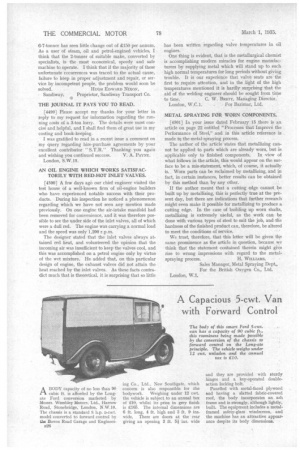OPINIONS and
Page 39

Page 40

If you've noticed an error in this article please click here to report it so we can fix it.
UERIES
CLASS A AND B CARRIERS WHO IGNORE THE ' WAGE RECOMMENDATIONS.
[4495] We are very concerned at the apparent lack of effort Made bY the authorities to enforce the new _wages award as agreed between the National joint Conciliation Board-and the employees' organizations.
Many of the operators in this district are entirely disregarding this condition of their A or B licences, and we feel that unless some definite action be taken to deal with these offenders, either by _suspension or complete revocation of their carriers' licences, the operator who, under very trying conditions, is endeavouring to " play the game " will continue to be severely penalized.
As a company, we look to the Road and Rail Traffic Act to clean up the industry, but its non-enforcement will most certainly lead to the same chaotic conditions throughout The trade as before.
A. F. SHAW, Director,
Feltham. For Morton Engineering Co., Ltd.
MORE ABOUT TRAPPING ACTIVITIES BY THE POLICE.
[4496] Having been a victim of police persecution in connection with speed limits, I am naturally delighted to see that someone has had the -grit to tackle them. I would like to suggest that motorists, and particularly A, B and C licence-holders and commercial drivers, bring some pressure to bear on petrol-companies and vehicle manufacturers with the view to asking them to help us through their advertisements.
Such concerns as Shell Mex,. B.F., Pratts, Wakefield, Leyland, Morris, Ford, Austin, Vauxhall,. and Cornmer could do a great deal by using a portion of their space in the big daily papers in a similar manner to that of advertisers for the benefit of Earl Haig's appeal about Armistice Day. In offering advertising to these papers, the people I mention could try to get the papers to keep up a continual fire at the departments responsible. After _all, the companies that could do this are all fighting for the trade of the vehicle owner and, indirectly, the driver, and a large portion of the advertising revenue must come out of the profit on the article sold, so that the haulier, driver, or private ov;-ner is contributing a great deal towards this publicity. If a running fire were to be kept up for some time we might. get something done.
What I cannot understand about the police patrol men who do this class of slinking job, is how their consciences allow them to carry on; probably they have to get c.as-2s or get out. Anyway, they are maintaining their jobs on a good wage with good hours, whilst the work they do compels them to take the bread and butter away from hard-working men, their wives and children. If these policemen are compelled to take on these jobs, it is, of course, a different matter, but they can at least stick to genuine cases and, when on patrol, stay on the main road where they can easily be seen, and if at 'night leave their lights on instead of hiding up some indistinguishable road end, or with their backs to oncoming traffic, with no "Police" sign on the car. The average policeman seems to forget that his chief work should be prevention of an offence.
I wish you every success with your campaign to stop
the. persecution of drivers. C LICENCE. Bury.
MEETING TRANSPORT REQUIREMENTS IN PALESTINE.
[4497] We have just received an inquiry from a fnm of bodybuilders in Tel-Aviv, Palestine, in reply to our advertisement in The Commercial Motor regarding our lightweight bodywork for commercial vehicles.
It is interesting as showing the wide circulation of your journal and, incidentally, the rapid development of Palestine since the war. Tel-Aviv is, as you are probably aware, the modern city that has sprung up on what was formerly a sandy waste.
G. M. CLEMENT, Director, For Clement, Butler and Cross, Ltd.
Brentford.
GOOD BRAKING ON THE MAJORITY OF ARTICULATED SIX-WHEELERS.
[4498] As a reader of your journal for very many years, I feel that for once I should like to draw your attention to an item which appeared in a recent issue of The Commercial Motor, and which might prejudice people against certain makes of vehicle converted to six-wheelers to carry 'six tons.
As the user of most forms of heavy vehicle for road transport for the past 13 years, I consider myself in a position to offer my opinion on this controversial subject.
I find that the braking systems on five of this type of vehicle, which I have in service at present, are most efficient, the driver being able to lock all wheels, at 30 m.p.h. if necessary, with a 6-7-ton load.
If converting these vehicles were to endanger the safety margin, would not maintenance also be heavy? In 30,000 miles I have had one of these vehicles cost less than £3 for replacements, incidentally, a certain make of 6-7-tonner has seen little change out of per annum.
As a user of steam, oil and petrol-engined vehicles, I think that the 2-tonner of suitable make, converted by specialists, is the most economical, speedy and safe machine to operate. I think that if the majority of these unfortunate eccurrences was traced to the actual cause, failure to keep in proper adjustment and repair, or service by incompetent people, the problem would soon be solved. Mai EDWARD NixoN, Sandiway. , Proprietor, Sandiway Transport Co.
THE JOURNAL IT PAYS YOU TO READ.
[4499] Please accept my thanks for your letter in reply to my request for information regarding the running costs of a 3-ton lorry. The details were most concise and helpful, and I shall find them of great use in my costing and book-keeping.
I was gratified to read in a recent issue a comment on my query regarding hire-purchase agreements by your excellent contributor " S,T.R." Thanking you again and wishing you continued success. Y. A. PAYNE. London, S.W.15. "
AN OIL ENGINE WHICH WORKS SATISFACTORILY WITH RED-HOT INLET VALVES.
[45001 A few days ago our chief engineer visited the test house of a well-known firm of oil-engine builders who have experienced notable success with their products. During his inspection he noticed a phenomenon regarding which we have not seen any mention made previously. On one engine the air-intake manifold had been removed for convenience, and it was therefore possible to see the under side of the inlet Valves, all of which were a dull red. The engine was carrying a normal load and the speed was only 1,200 r.p.m.
The designer stated that the inlet valves always attained red heat, and volunteered the opinion that the incoming air was insufficient to keep the valves cool, and this was accomplished on a petrol engine only by virtue of the wet mixture. He added that, on this particular design of engine, the exhaust valves did not attain the heat reached by the inlet valves. As these facts contradict much that is theoretical, it is surprising that so little
has been written regarding valve temperatures in oil engines.
One thing is evident, that is the metallurgical chemist is accomplishing modern miracles for engine manufacturers by supplying metal which will stand up to such high normal temperatures for long periods without giving trouble. It is our experience that valve seats are the first to require attention, and in the light of the high temperatures mentioned it is hardly surprising that the aid of the welding engineer •should be sought from time to time. C. W. BRETT, Managing Director.
London, W.C.I. For Barimar, Ltd.
METAL SPRAYING FOR WORN COMPONENTS.
[45011 In your issue dated February 15 there is an article on page 22 entitled "Processes that Improve the Performance of Steel," and in this article reference is . made tq the metal-spraying process.
The author of the article -states that metallizing cannot be applied to parts which are already worn, but is applicable only to finished components. In view of what follows in the article, this would appear on the surface to be a mis-statement, which, of course, it actually is. Worn parts can be reclaimed by metallizing, and in fact, in certain instances, better results can be obtained by this method than by any other.
If the author meant that a cutting edge cannot be
built up by metallizing, this is perfectly true at the present day, but there are indications that further research might even make it possible for metallizing to produce a cutting edge. In the case of building up worn shafts, metallizing is extremely useful, as the work can be done with various types of steel to suit the job, and,the hardness of the finished product can, therefore, be altered to meet the conditions of service. ,
We trust, therefore, that this letter will be given, the same prominence as the article in question, because we think that the statement contained therein might give rise to wrong impressions with regard to the metal spraying process. H. WILLIAMS, • Sales Manager, Metal Spraying Dept., For the British Oxygen Co., Ltd. London, W.I.




























































































